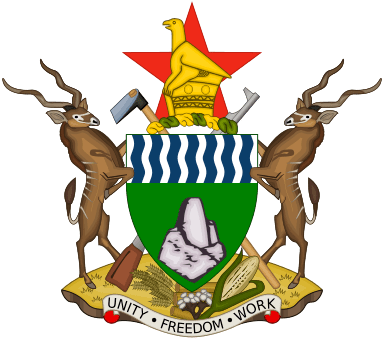- Information
- iGambling
- Blask
- prev
- next
Gambling regulation
-
Online casino:Not regulated
-
Online sports betting:Regulated
-
Gambling in detail:
Population
- Population: 15967000 people.
- Official Language: English
- HDI: 0,550
- Poverty rate: 85%
- Gini: 50.3%
- The believing population: 88%
- Main religion: Christianity (87%)
- Second religion: Atheism (7.9%)
Harmful habits
- Alcohol: 3.1 litres/year
- Smoking: 11.7%
Internet
- Internet users: 28%
- Internet speed: 14 Mbps
- Country Top Level Domain: .ZW
General information about the country
-
Country name:Zimbabwe
-
Code (2-digit):ZW
-
Continent:Africa
-
Country level:N/A
-
Capital:Harare
-
Country area:390580 sq km.
-
Telephone code:263
-
Currency (code):US dollar (USD)
Geographical features of the country
Administrative division into regions
Province (10): Bulawayo, Mashonaland East, Mashonaland West, Manicaland, Masvingo, Midlands, Matabeleland North, Harare, Mashonaland Central, Mashonaland South.
Features of the country
The modern territory of the country was partially or fully occupied by the states: Monomotapa, British Empire (now Great Britain).
The rivers flow through the territory: Zambezi, Limpopo.
Mountains on the territory of the country: Inyangani, Binga.
Gambling regulation
-
Online casinos:Not regulated
-
Online sports betting:Regulated
Read more about regulation
The government of Southern Rhodesia - as Zimbabwe was called under colonialism - led to the introduction of laws prohibiting locals from participating in gambling starting in 1914.
Gambling did not become officially legal in Zimbabwe until 2000. Offline casinos, BC, lotteries, and online sports betting and horse racing are allowed in the country.
The Lotteries and Gambling Board (LGB) is the regulatory body responsible for controlling and monitoring the gambling industry.
Gambling is authorised for those over the age of 18. Illegal online casinos and betting platforms are prohibited. Players who use such sites can receive a fine of up to $400 and/or imprisonment for up to one year.
Earlier this December, the government announced the introduction of a 10% tax on sports betting winnings. The law was enacted to increase government revenue and will come into effect on 1 January 2025. The winnings tax is likely to discourage bettors and encourage even more use of offshore platforms.
Top payment systems
- EcoCash
- PesaPal
- CBZ
- Sasai
- ZimSwitch
Online Gambling in the country
With an increasing number of Zimbabweans owning mobile phones, online gambling has become a way for young people to earn money, given the high poverty levels in the state.
According to a study by the University of Cape Town and the University of California, online betting is encouraging young Zimbabweans to not only purchase smartphones and other devices, but also to learn new digital skills or improve existing ones.
However, the industry is still at an early stage of development compared to more mature African markets.
The cornerstone of the sector, apart from limited internet access, is the Lotteries and Gambling Act of 1998, which lacks regulations for iGaming.
However, online sports betting is currently authorised in the country. However, due to poor control of the sector and an underdeveloped regulatory framework, Zimbabweans are increasingly turning to offshore.
Population
The country has a population of over 16 million. The population growth rate is 1.8% in 2024.
32.7 per cent of the country's citizens live in urban areas, while 67.3 per cent live in rural areas.
At the beginning of 2024, the population had the following age distribution:
- 13.9% - under 4 years of age
- 21.2 per cent between 5 and 12 years of age
- 11.6 per cent - from 13 to 17 years of age
- 14.3 per cent - 18 to 24 years of age
- 14.3 per cent from 25 to 34 years of age
- 11.7 per cent - 35 to 44 years old
- 6.6 per cent - 45 to 54 years old
- 3.2 per cent - 55 to 64 years old
- 3.2 per cent - 65 and over
The average age is 19 years. The average life expectancy reaches just over 60 years.
The literacy rate (ability to read and write) among youth aged 15 to 24 years is 91.73 per cent and among adults 84.6 per cent.
The predominant ethnic group is African, accounting for 98 per cent of the population (including the Shona, Ndebele and Matabele peoples). Mulattoes and Asians make up 1 per cent and Europeans less than 1 per cent.
Language: The official language is English. From about grade 4, education in the country is conducted almost entirely in English.
Besides English, local languages predominate: Shona and Ndebele.
Religion: adherents of syncretic beliefs, representing a combination of Christianity and paganism, make up 50 per cent of the population. Christians - 25 per cent, adherents of local traditional beliefs - up to 24 per cent, Muslims - 1 per cent.
Major cities: Harare (capital), Bulawayo, Chitungwiza, Mutare, Gweru.
Currency: US dollar (USD), Zimbabwean gold (ZIG). 100 ZIG= $15.
There have been many official currencies in Zimbabwe. None of them have been able to achieve the necessary stability to help the country cope with the challenges of inflation.
In April 2024, the authorities made one last attempt and introduced the Zimbabwean Gold (ZIG) currency. The monetary unit is pegged to foreign currencies, gold, diamonds and other precious stones held in Zimbabwe's reserves.
Nevertheless, the US dollar remains the preferred monetary unit for everyday use in the country. It is used in 87 per cent of local transactions.
Financial Opportunities
Zimbabwe is an African country rich in gold, diamonds and other resources. During colonial rule, it had a strong infrastructure in place. However, today Zimbabwe is one of the poorest countries in the world.
Nearly one in three of the state's residents lives below the international extreme poverty line, which is $1.90 a day. About two out of five residents live on $3.2 a day.
The overall unemployment rate is 36%. The unemployment rate for youth (ages 15-24) is 15%.
Average wage - from $150, minimum wage - from $80.
Mentality
Zimbabwe gained independence from Britain in 1980. The effects of colonisation continue to be felt in various spheres of life of the population. This is evident in the widespread use of the English language, the adoption of Christianity and related values in family traditions.
Zimbabweans are eager to show wealth and often mention their home region when making acquaintances, indicative of their linguistic background and sometimes reflecting social status and political beliefs.
Residents prefer to wear colourful clothing. Especially popular are clothes that cover as many areas of the body as possible at once. Red symbolises protection and strength, while green symbolises fertility and prosperity.
In Zimbabwe, black magic rules everything, so omens and superstitions are connected with it. Here many people practice witchcraft - predicting the future, witchcraft and contact with the souls of the deceased. Even churchmen tacitly believe in the existence of black magic.
Zimbabweans often interpret the behaviour or appearance of certain animals as omens. For example, the appearance of a butterfly is interpreted as a sign of good luck, while an encounter with lizards is considered a sign of bad luck.
Certain days in a month or year are seen as particularly auspicious: the new moon symbolises new beginnings, while the full moon is associated with the completion of affairs.
In the culture of many African peoples, including Zimbabweans, the number 7 is considered lucky. It is associated with completeness and harmony.
Volume of iGaming market
According to the country's Revenue Authority, the gambling industry (online and offline formats) generated about $7 million in taxes in 2020.
Most of Zimbabwe's punters bet between 1 and 7 years, starting from the age of 16. Their passion for football was the reason for their interest in the industry, while others were inspired by football fans who were already involved in betting.
Internet availability
At the start of 2024, 4G network coverage was 44.15 per cent and internet penetration was 33.73 per cent. In comparison, in January 2021, internet penetration was 33.4 per cent.
The low internet availability is due to the high cost of internet services and periodic outages due to political or economic factors.
The average speed of wireless connection via Wi-Fi is 9.85 Mbps. There is no information on the average speed of mobile internet connection.
The volume of device usage:
- mobile - 97%
- desktop - 2.6%
- tablet - 0.4%
Popular web applications:
- Facebook Massenger
- Twitter.
The number of social media users increased by 750k between 2023 and early 2024.
Number of active users at the beginning of 2024:
- Facebook - 2.05 million
- LinkedIn - 890 thousand
- Instagram - 580 thousand
- Facebook Massenger - 466 thousand
- Twitter - 336.3 thousand
Player preferences
Before 2000, before the Zimbabwean crisis, the main types of gambling that did not have legal status were lotteries, betting on horse races and dog racing.
Online betting is now leading the industry, with football being the most popular sport. Leading the way among the betting types are express bets.
The Zimbabwe Premier League (PSL) is the main professional football competition in the country. Zimbabweans are also more likely to bet on the most popular football leagues: the English Premier League, La Liga, French and Italian leagues, whose matches can be watched on SuperSport TV.
In football, the most popular countries are Brazil, Argentina, Paraguay and Uruguay, as well as European teams - Spain, France, England and Belgium.
In African international tournaments, popular national teams are Algeria, Morocco, Tunisia, Ghana, Cameroon and Nigeria.
Online slots, roulette and baccarat are popular in online gambling, predominantly among the youth. Lotteries and scratch cards have not lost their relevance in this geo either.
Gambling affiliate programmes that accept traffic from this country
- Blask data from: 06/03/2025
- The data for this section was provided by the analytical service Blask.com. Currently, the service's database contains information on 62 countries and more than 2,500 brands. You can view all available countries with Blask statistics at this link.
- Share
- prev
- next


